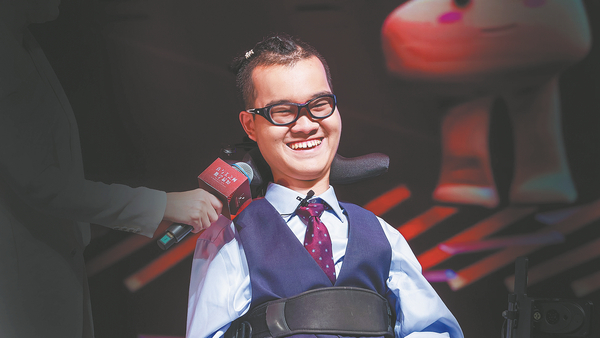

Editor's note: "However bad life may seem, there is always something you can do, and succeed at it." This is a famous line from "The Theory of Everything", an Oscar-winning film which portrays the inspiring life story of legendary mathematician Stephen Hawking. Although Hawking died five years ago, his spirit lives on. Below, you will read the personal story in his own words of Benjamin Lou, a 20-year-old Chinese American mathematician living with Spinal Muscular Atrophy (SMA), and currently studying at Massachusetts Institute of Technology (MIT) in the United States. According to Alan Guth, Lou's supervisor at MIT and a professor who once worked with Hawking himself, the two share many similarities.
Although I've never taken a physical step on this planet, in the rich and magnificent cosmos of mathematics and physics I soar.
Diagnosed with SMA, I've grappled with immense physical challenges since infancy. This condition destroys motor nerve cells in the spinal cord, taking away my ability to walk, eat, or use the restroom without assistance. In the past two decades of my life, I have undergone several major surgeries including spinal fusion. However, these limitations and struggles can't stop me from achieving boundless freedom in the realms of mathematics and physics.
I started to take a fancy to mathematics back in my childhood and was brought into contact with calculus when I was a fourth-grader. I'm always fascinated by the biggest questions that I can't yet answer. For example, why can we prove anything meaningful in math? Amid the vast realms of "groups", "measures", "ordinals", "manifolds", and so on, why does a coherent, unified structure emerge? Why is it that, by manipulating abstract mathematical entities, we can make predictions about the world that are verified to extraordinary accuracy? Mathematics could have easily been an intractable enigma, and yet, miraculously, inexplicably, humanity has been able to unravel a myriad of profound truths.
The imagination that mathematics has given me has also won me a few notable academic successes. By fifth grade, I scored in the top one percent on the AMC 10, a competition aimed at high school sophomores. I won a gold medal at the World Mathematics Team Championship in Beijing. In 8th and 9th grade, I qualified for the USA Mathematics Olympiad, being among the top 250 young mathematicians in the nation. A similar qualification for the USA Physics Olympiad soon followed. My love of the mathematical sciences eventually led me to MIT, where I pursue double majors in physics and mathematics, as well as a minor in philosophy.